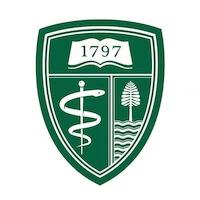Biomedical Data Science Grand Rounds
Speaker: Yves Fomekong Nanfack, Ph.D., Associate Director at EMD Serono, a division of Merck KGaA
Please join us for Biomedical Data Science Grand Rounds with Yves Fomekong Nanfack, Ph.D.,Associate Director at EMD Serono, a division of Merck KGaA on Thursday, February 28 at 1:00 p.m. in Auditorium E (DHMC).
Talk title: “In silico antibody discovery @ EMD Serono”
Refreshments will be served on a first-come, first-served basis.
Abstract
Antibodies are used extensively as therapeutic agents due to their ability to interact with challenging targets and to promote engagement of the host’s own immune system. Generating antibodies towards a desired target is one of the key steps in the process of drug development. In recent decades several methods have been applied to generate antibodies such as immunization of engineered rats or display technologies. Each of these methods delivers many candidates that are screened for specificity, affinity and biological activity. Although the discovery process involves many steps, the selection of the top candidates occurs relatively earlier largely due to the resource intensive nature of the process. To reduce associated risk of failure, it is essential to carefully select the suitable candidates, by a rigorous assessment of their properties. Many factors can impair the likelihood of producing a successful antibody, from potential immunogenic response to lack of efficacy to poor developability (e.g. aggregation, solubility, stability), safety (immunogenicity) and drug-like properties. To boost the success of each antibody, sequence optimization is used to minimize liabilities associated with each property and modulate the potency and specificity. This is done by modifying the antibody sequence while conserving its binding affinity and biological activity. This is a laborious process that requires in-depth knowledge of biochemical and biophysical properties and their association with the different developability parameters. In addition, molecular structural information, usually not available at high throughput, should be used to provide a higher level of confidence in the assessment of each liability.
Here we present how we leverage in silico methods to characterize, prioritize and optimize antibodies. Our approaches combine structural biology, molecular dynamics, bioinformatics and machine learning. The outcome allows scientists to significantly accelerate the discovery process by applying more rigorous and rational methodology, thus testing the most relevant and diverse antibodies with the best profile to become a therapeutic molecule.
Biography
Dr. Fomekong Nanfack is Associate Director at EMD Serono, a pharmaceutical company, and a division of Merck KGaA, Darmstadt, Germany. Dr. Fomekong Nanfack is leading the “structural and Digital Drug Discovery” group, an interdisciplinary team of scientists built around a core of experts to drive drug discovery of small molecules and biologics. The unique approach of the group is to combine experimental science such as crystallography with quantitative and qualitative in silico approaches that span computational chemistry and biology, structural biology, mathematics and data science.
Prior to joining EMD Serono, Dr. Fomekong Nanfack was located in Geneva, Switzerland at Merck Serono, where he held a computational biologist position focusing on antibody engineering and bioinformatics for molecular biology. In his early professional years, prior to joining the pharma industry, Dr. Fomekong Nanfack has worked in image processing and computational finance.
Please see this link for more details: bmds.dartmouth.edu
